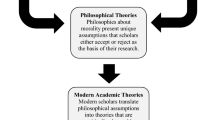Abstract
Although managers spend over twenty percent of their time in conflict management, organization theorists have provided very few guidelines to help them do their job ethically. This paper attempts to provide some guidelines so that organizational members can use the styles of handling interpersonal conflict, such as integrating, obliging, dominating, avoiding, and compromising, with their superiors, subordinates, and peers ethically and effectively. It has been argued in this paper that, in general, each style of handling interpersonal conflict is appropriate if it is used to attain organization's proper end.
Similar content being viewed by others
References
Aristotle (1): 1984, ‘Nicomachean Ethics’ (trans. W. D. Ross), in J. Barnes (ed.),The Complete Works of Aristotle: The Revised Oxford Translation (Princeton University Press, Princeton, NJ) (The location of the reference is further specified in terms of book (Roman numeral) and chapter (Arabic numeral)).
Aristotle (2): 1984, ‘Politics’ (trans. B. Jowett), in J. Barnes (ed.),The Complete Works of Aristotle: The Revised Oxford Translation (Princeton University Press, Princeton, NJ) (The location of the reference is further specified in terms of book (Roman numeral) and chapter (Arabic numeral)).
Barnes, J. (ed.): 1984,The Complete Works of Aristotle: The Revised Oxford Translation (Princeton University Press, Princeton, NJ).
Blake, R. R. and Mouton, J. S.: 1964,The Managerial Grid (Gulf Publishing, Houston, TX).
Brown, L. D.: 1983,Managing Conflict at Organizational Interfaces (Addison-Wesley, Reading, MA).
Cosier, R. A. and Dalton, D. R.: 1990, ‘Positive Effects of Conflict: A Field Assessment’,International Journal of Conflict Management 1, pp, 81–92.
Elliston, F.: 1985,Whistleblowing Research: Methodological and Moral Issues (Praeger Publishers, New York).
Follett, M. P.: 1940, ‘Constructive Conflict’, in H. C. Metcalf and L. Urwick (eds.),Dynamic Administration: The Collected Papers of Mary Parker Follett (Harper, New York) (originally published, 1926), pp. 30–49.
Janis, I. J.: 1972,Victims of Groupthink (Houghton Miffilin, Boston).
Lawrence, P. R. and Lorsch, J. W.: 1967, ‘Differentiation and Integration in Complex Organizations’,Administrative Science Quarterly 12, pp. 1–47.
Likert, R. and Likert, J. G.: 1976,New Ways of Managing Conflict (McGraw-Hill, New York).
McKeon, R.: 1951, ‘Philosophy and Method’,Journal of Philosophy 48, pp. 653–682.
Rahim, M. A.: 1983, ‘A Measure of Styles of Handling Interpersonal Conflict’,Academy of Management Journal 26, pp. 368–376.
Rahim, M. A.: 1986,Managing Conflict in Organizations (Praeger Publishers, New York).
Rahim, M. A. and Bonoma, T. V.: 1979, ‘Managing Organizational Conflict: A Model for Diagnosis and Intervention’,Psychological Reports 44, pp. 1323–1344.
Robbins, S. P.: 1978, ‘“Conflict Management” and “Conflict Resolution” Are Not Synonymous Terms’,California Management Review 21(2), pp. 67–75.
Thomas, K. W. and Schmidt, W. H.: 1976, ‘A Survey of Managerial Interests with Respect to Conflict’,Academy of Management Journal 19, pp. 315–318.
Thomas, K. W.: 1976, ‘Conflict and Conflict Management’, in M. D. Dunnette (ed.),Handbook in Industrial and Organizational Psychology (Rand McNally, Chicago), pp. 889–935.
Thomas, K. W.: 1977, ‘Toward Multi-Dimensional Values in Teaching: The Example of Conflict Behaviors’,Academy of Management Review 2, pp. 484–490.
Velasquez, M. G.: 1988,Business Ethics: Concepts and Cases (Prentice-Hall, Englewood Cliffs, NJ).
Watson, W.: 1985,The Architectonics of Meaning (State University of New York Press, Albany, NY).
Wilson, J. A. and Jerrell, S. L.: 1981, ‘Conflict: Malignant, Beneficial, or Benign’, in J. A. Wilson (ed.),New Directions for Higher Education: Management Science Applications in Academic Administration (Jossey-Bass, San Francisco, CA), pp. 105–123.
Author information
Authors and Affiliations
Additional information
M. Afzalur Rahim is Professor of Management at Western Kentucky University. He holds B.Com. (Hons.) and M.Com, M.B.A., and Ph.D. degrees. Dr. Rahim teaches courses on organizational behavior, strategic management, and management of organizational conflict. He is the author of over 65 articles and book chapters, five cases, and three research instruments on conflict and power. He is the author of six books, four of which are on conflict management. He is the editor of theInternational Journal of Conflict Management and theInternational Journal of Organizational Analysis. He is the founder of the International Association for Conflict Management and President of the International Conference on Advances in Management.
Jan Edward Garrett is Associate Professor in the Philosophy and Religion Department at Western Kentucky University. His recent publications include ‘Persons, Kinds and Corporations: An Aristotelian Perspective,’ which appeared inPhilosophy and Phenomenological Research, and ‘Unredistributable Corporate Moral Responsibility,’ which appeared in this journal.
Gabriel F. Buntzman is Associate Professor of Management at Western Kentucky University. His current research interests concern relationships between ethics, conflict and the strategic management of organizations. His work in the area of conflict management has appeared in theInternational Journal of Conflict Management, theJournal of Psychology, and three books.
Rights and permissions
About this article
Cite this article
Rahim, M.A., Garrett, J.E. & Buntzman, G.F. Ethics of managing interpersonal conflict in organizations. J Bus Ethics 11, 423–432 (1992). https://doi.org/10.1007/BF00870554
Issue Date:
DOI: https://doi.org/10.1007/BF00870554




